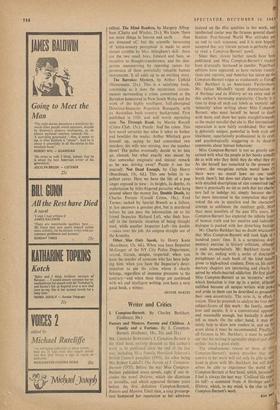Writer and Critics
I. Compton-Burnett. By Charles Burkhart. (Gollancz, 30s.)
Pastors and Masters. Parents and Children. A Family and • a Fortune. By I. Compton- Burnett. (Gollancz, 18s., 21s. and 21s.) MR. CHARLES BURKHART's I. Compton-Burnett is the third book entirely devoted to this author's work to be published since the end of the last war, including Miss Pamela Hansford Johnson's British Council pamphlet (1951), the other being Mt Robert Liddell's The Novels of I. Compton- Burnett (1955). Before the war Miss Compton- Burnett published seven novels, eight if one in- cludes the novel Dolores, which she dismisses as juvenilia, and which appeared thirteen years before the first definitive Compton-Burnett, Pastors and Masters. Until then, a cosy presump- tion hampered her reputation as 116r admirers SPECTATOR. DECEMBER 10, 1965 insisted on the elite qualities in her work, and intellectual caviar was the fatuous general classi- fication. Post-Second World War attitudes put an end to such nonsense, and it is now happily accepted that any literate person is perfectly able to read a Compton-Burnett novel.
Since then, eleven further novels have been published, and Miss Compton-Burnett's readers have drastically increased in number. Paperback editions have appeared, as have various transla- tions and reprints, and America has taken up the Compton-Burnett vogue as assiduously as Eures (Mr. Burkhart is an American). Furthermore. Mr. Julian Mitchell's recent dramatisation of A Heritage and its History set an extra seal on this author's increasing popularity. Clearly it is time to drop all such coy labels as 'esoteric' and 'minority' when writing about Miss Compton' Burnett, who must herself be bored to death with them, and show her quite straightforwardly as the major novelist that she is. Her international reputation is now fairly established. Her work is definitely unique, powerful in both style and treatment, superlatively professional in its craft, and psychologically staggering in its dead-on comments about human behaviour.
Miss Compton-,Burnett is not so greatly con' cerned with what the people in her books actually do as with why they think they do what they do. As she herself has remarked to the present re' viewer, she recognises certain moral laWs (`ii there were no moral laws no • one . could break them'), but does not clutter up her books with detailed descriptions of sins committed (air) there is practically no sin as such that her charic' ters fail to indulge in), simply because she i5 far more interested in the temptation that pro' yoked the sin in question and the characters attempt to sublimate the resultant guilt. More than most novelists of the past fifty years, IVY Compton-Burnett has explored the infinite layers of human truth and her positive and individU3I dialogue is packed with her disturbing findings. Mr. Charles Burkhart has no doubt whatsoever that Miss Compton-Burnett Will rank high in 3 hundred years' time. It is a scrupulous docn" mentary exercise in literary criticism, although it ends inconclusively. Mr. Burkhart leaves v5 in the air, ending with a series of descriptiVe paraphrases of each book of the kind usually given to high-school students. Even so, his intro' ductory chapters are interesting and clearly in' spired by whole-hearted addiction. He first places Miss Compton-Burnett as an `eccentric' writer, which limitation is true up to a point, although nullified because all unique writers with poW,.4 and pride in them can be described as possessing their own eccentricity. The term is, in effect, 3 truism. Then he proceeds to analyse the four main subject-forces of this work: the family, .money' love and secrets. It is a conventional approach and reasonable enough, but basically it doe9o,' tell us much. On the other hand, it may cer: tainly help to draw new readers in, and on OP score alone it must be recommended. Finally,1 all fairness to Mr. Burkhart, it must be pointer out that his writing is agreeably elegant and oftel1 stylish; this is a good study.
• , The simultaneous reissue of three of Mr Compton-Burnett's novels provides that nell
corners to her work will not only be able to wall hand in glove with Mr. Burkhart, but will thettl: selves be able to experience the world of i Compton-Burnett at first hand, which, personally' I feel is always the best way. 'Civilised life exacts j its toll'—a comment from A Heritage and 11 History, which, to my mind, is the clue to Miss Compton-Burnett's work.






































 Previous page
Previous page